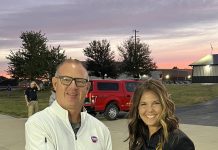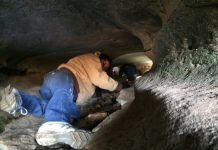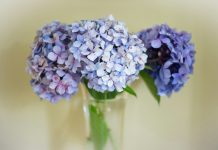I have made a small shrine to honor my husband David’s 5 years of sobriety and our continuing journey. Composed of 5 miniature empty bottles gathered on our Sunday walks along creeks curving through the woods, my little shrine is put together in a rusty red toolbox tray. The miniature, uncapped flasks are arranged hanging upside down to make the arch of a rainbow. Is there gold at the end? Will our continuing steps on this sobriety walk lead us there? Will we learn how to take the challenges of these past five years and transmogrify them into spendable currency for good?
Atop the shrine’s tray there are wooden blocks with letters on the back sides and numbers—1, 2, 3, 4, 5—facing forward. These are treasures from my childhood—the building blocks I played with over and over as I learned about numbers and letters.
Describing the shrine I have made honoring my husband, I feel immensely grateful for the privilege of walking this walk of sobriety with David, but I must confess this has been so much harder and much more challenging than I anticipated, though he has not touched a drink since we married.
The easiest decision and action came early when we cleared our home of alcohol and all the accoutrements that can go with the drinking life. Next came a stretch of David’s second guessing. Had he made the right choice? Was he ready? Couldn’t he drink just a little?
The lingering appeal of the old life has been powerful. Since that initial act of commitment and the doubting time that followed, each step forward has been processed through filters of denial, resistance, depression, stone-walling, back paddling, behavioral relapsing and checking out. Steadiness and stability have been hard to achieve and to sustain. The resolve for change has been elusive. Choosing to stay present to create a better future has presented a daunting learning curve. The hard work required emotionally has been at times overwhelming.
When David quit drinking, he stopped cold turkey with only me and his determination as his support. Without the numbing effects of alcohol in his system, the troubling emotions of resentment and anger—masked by drinking for 52 years—rose to the surface and were expressed with terrifying forcefulness. Anti-depressants were prescribed. They helped with the anger but over time rendered David emotionally dysfunctional. They were taken away.
I now realize to stop drinking and to depend on prescribed drugs to moderate behaviors are not enough to bring about the radical transformation an alcoholic must experience. Relationship and coping skills, ordinarily learned as part of an adolescent’s development but delayed by the early escape into drinking, must be retroactively mastered for a new life to be built and the art of living sober to be enjoyed.
For 5 years I have kept walking the walk with David, wishing, hoping and praying a mentoring couple would come into our life—those who have been through what we are experiencing, someone to guide us and help us learn the art of being happy in sobriety.
Though that couple has yet to appear, support has come through the caring and love of family and friends, the wisdom of experienced therapists and the fellowship of AA. I offer my small shrine in gratitude for these and for David’s courage that has gotten us through 5 years to here and for his continuing to practice the art of making a new life. For David’s sobriety and a beautiful life ahead, I am grateful.
A beautiful life is now on display in the galleries of Hyde House. Come see the paintings of Al Gritten and Sandra Parrill in SPIRITUAL SPACES through September 17. Weekend gallery hours: Fridays and Saturdays, 12:00-5:00 p.m. Mark your calendars to celebrate the magic of the HOLIDAY BOUTIQUE opening October 7.
















